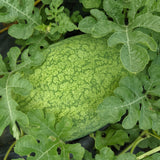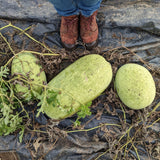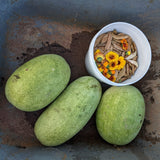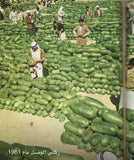Ali Baba Watermelon (Iraq)
Citrullus lanatus
“Reggi” is the Iraqi slang for watermelon. This sweet fruit is beloved by all Iraqis on a hot summer’s day, eaten on its own or with salty white cheese. Vendors in Iraq will cut open the melon for customers to assess the fruit before buying. Ali Baba watermelon is an Iraqi heirloom variety known for its light green oblong shaped rind. The ultra sweet flesh ranges from bright pink to red, with a distinct fruity aroma and flavor. Fruits can grow up to 30 lbs in warmer climates, while still reliably growing smaller fruits in cooler climates. These melons are known for their resistance to sun damage and drought, their transportability, and high yields. Ali Baba was first introduced in the U.S. in the 90s by Iraqi seed saver Aziz Nael. This particular strain is a cross of seed domesticated in the U.S. along with seed brought more recently from Iraq in 2021.
These seeds were cultivated by the Iraqi Seed Collective, a group of diasporic people of Mesopotamian heritage who are saving seeds to uplift and preserve ancient culture from the fertile crescent. 10% of the sale of this seed goes to the Iraqi Seed Collective.
Due to years of war, colonialism, and the destruction of the Iraqi national seed bank during the 2003 US invasion, and present-day, ongoing waterway diversion by Turkey and Iran, traditional Iraqi plant varieties and seed saving practices have been disrupted and threatened. We have a responsibility to help keep these endangered varieties – stemming from the dawn of agriculture – in circulation.
Photos from the Iraqi Seed Collective.
Days to maturity: 85
Seeds per pack: 25 min
Germination rate: 88% on 02/22/2024
Planting / harvesting notes
Direct sow in warm soil after the last frost, or seed indoors 3-4 weeks beforehand and transplant. Space 12-18" apart in rows that are 6-8' apart. Keep ground slightly moist until germination, but do not overwater. Watermelons love heat and well drained soils.
Seed keeping notes
Watermelons are insect pollinated and need 1/2 mile between different varieties of C. lanatus to prevent unwanted cross-pollination. It is difficult to know when a watermelon is truly ripe. In Seed to Seed by Suzanne Ashworth, she recommends waiting until the small tendril opposite the melon's "peduncle" (stem attachment) changes from green to brown and dries out. You can also look for color changes in the skin, and listen for a thud when the fruit is tapped. Seeds are ready for harvest when the melon is ready to eat. Dry them out in a ventilated place away from direct sunlight.













